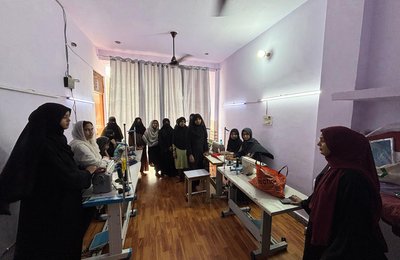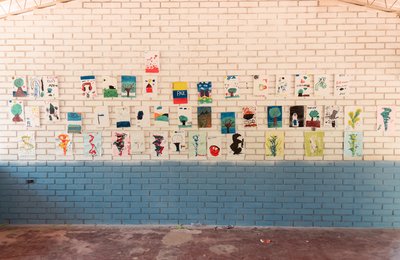Update, March 9th: On International Women’s Day, 17 Iraqi Women’s organizations announced the creation of a national network to combat violence against women in Iraq.
The network, called Nuhud, has announced its focus on advocating for women’s rights and protecting them from all kinds of violence. While annual reports documenting all abuses committed against Iraqi women and their rights will be disseminated to stakeholders, monitoring of national laws will be conducted to ensure their compliance with international conventions.
Soon after the launch of the US-led war in 2003, Iraq witnessed the emergence of a violent conflict and the deepening of splits along communal, religious, confessional, tribal and ethnic lines. The resulting chaos gave rise to growing insecurity and lawlessness and an upsurge in religious extremism. A backlash against women’s rights and feminist activists was seen, opening old and new avenues for discrimination and violence against women. Women’s bodies and women’s independence became the battleground of ethnic, religious and political strife. As violence increased dramatically in 2006 across the country, the climate of fear pushed many girls out of school and many women out of work, thus allowing families and community leaders to impose many restrictions on the life of women. Religious groups launched pressure campaigns on women to avoid ‘immoral’ or ‘un-Islamic’ behaviour, forcing them to wear headscarves – including Christian women in Baghdad. Unmarried women dressing improperly became the target of violent attacks in the streets of Basra. Women were increasingly used as a bargaining tool or gift among tribes, while forced marriages, kidnappings and honour-related crimes increased, in particular in the region of Kurdistan.

The violent conflict in Iraq has resulted in the disappearance of women from the public sphere and has minimised their role in decision–making processes. In order to ensure a sustainable post-conflict reconstruction process, and a sincere national reconciliation process, it is necessary to encourage an increased participation of women within the society and to seriously combat the occurrence of gender-based violence. Baghdad Women Association and the Women Leadership Institute are two organisations that have adopted an agenda to combat gender-based violence, and to build the leadership skills and capacities of women, so that women can play an active role in private and public spheres through increased participation in economic, social and political processes.

Baghdad Women Association has been running a listening and counselling centre in Baghdad since 2009, which provides a safe place for female victims of violence to receive psychological and free legal support. The Association has also been committed to raising awareness within the community about the negative consequences of gender-based violence, through education campaigns involving participative activities such as street theatre and drawing competitions. The Women Leadership Institute has been addressing issues of gender-based violence within schools and youth centers in Basra. Teachers and girls have been educated in these issues, while young boys and girls have been trained to conduct further peer-to-peer education. The Institute is also actively involved in lobbying Iraqi decision-makers, in regards to the application of UN Security Council Resolution 1325, which recognises women as victims of violent conflicts and as major actors in post-conflict reconstruction and peacebuilding processes.  Over the last months, several events have been organised in Iraq to engage local decision-makers and civil society in reflecting on the role of women in reconstruction and reconciliation processes. In July 2010, the UN Mission for Iraq (UNAMI) and the UN Development Fund for Women (UNIFEM) convened a round-table meeting to commemorate the tenth anniversary of Resolution 1325. Delegates emphasised the need to continue promoting women’s human rights and to concentrate efforts on eradicating violence against women. In January 2011, the International Alliance for Justice, and No Peace Without Justice, gathered decision-makers, and local and international civil society, for a conference on ‘the role of women in peace-building, reconciliation and accountability in Iraq”. A series of recommendations emerged from the event, which called for achieving gender equality in Iraq to ensure enhanced participation of women. As Iraqi grassroots organisations are working to combat violence against women, and foresee enhanced participation of women and girls at all levels of society, it is important that they also support processes that engage women in reconciliation and peacebuilding. The next step for women’s organisations in Iraq is to consider programmes that enroll women at the community level, in promoting peace and co-existence, among Iraq’s many different groups and communities.
Over the last months, several events have been organised in Iraq to engage local decision-makers and civil society in reflecting on the role of women in reconstruction and reconciliation processes. In July 2010, the UN Mission for Iraq (UNAMI) and the UN Development Fund for Women (UNIFEM) convened a round-table meeting to commemorate the tenth anniversary of Resolution 1325. Delegates emphasised the need to continue promoting women’s human rights and to concentrate efforts on eradicating violence against women. In January 2011, the International Alliance for Justice, and No Peace Without Justice, gathered decision-makers, and local and international civil society, for a conference on ‘the role of women in peace-building, reconciliation and accountability in Iraq”. A series of recommendations emerged from the event, which called for achieving gender equality in Iraq to ensure enhanced participation of women. As Iraqi grassroots organisations are working to combat violence against women, and foresee enhanced participation of women and girls at all levels of society, it is important that they also support processes that engage women in reconciliation and peacebuilding. The next step for women’s organisations in Iraq is to consider programmes that enroll women at the community level, in promoting peace and co-existence, among Iraq’s many different groups and communities.










